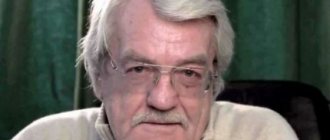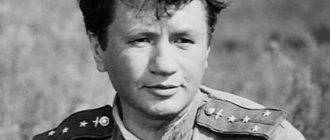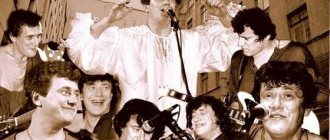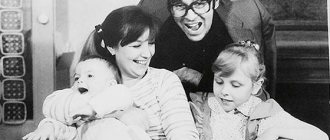Biography of Leonid Gaidai
Leonid Gaidai is a Soviet director, screenwriter and actor, People's Artist of the Soviet Union. A comedy genius whose films are still watched with pleasure today, and quotes from them are passed on from mouth to mouth.
In the photo: Leonid Gaidai
“Operation Y and other adventures of Shurik” was awarded the “Silver Dragon of Wawel” prize at the international festival in Krakow. During the period of distribution of Gaidai’s comedies in the USSR, more than three hundred million people watched them.
Awards and titles
- Honored Artist of the RSFSR (09/29/1969) - for services in the field of Soviet cinematography
- People's Artist of the RSFSR (03/28/1974)
- People's Artist of the USSR (08/18/1989)
- State Prize of the RSFSR named after the Vasilyev brothers (1970) - for comedies of recent years
- Order of the Patriotic War, 1st class (1985)
- Medal "For Military Merit" (1942)
- Medal "In Commemoration of the 100th Anniversary of the Birth of Vladimir Ilyich Lenin"
- Medal "For victory over Germany in the Great Patriotic War of 1941-1945"
- Jubilee medal "Twenty years of Victory in the Great Patriotic War 1941-1945"
- Jubilee medal "Thirty years of Victory in the Great Patriotic War 1941-1945"
- Jubilee medal "Forty years of Victory in the Great Patriotic War of 1941-1945"
- Jubilee medal "50 years of Victory in the Great Patriotic War 1941-1945"
- Medal "Veteran of Labor"
- Medal "50 years of the Armed Forces of the USSR"
- Medal "60 years of the Armed Forces of the USSR"
- Medal "70 years of the Armed Forces of the USSR"
- IFF of short films in Krakow (Main prize “Silver Dragon of Wawel”, film “Operation Y” and other adventures of Shurik”, 1965)
- All-Union Film Festival in Tbilisi (Diploma and Prize “For contribution to the development of the film comedy genre”, film “12 chairs”, 1972)
- Soviet Film Festival in Sorrento (Special Prize “Silver Siren”, film “12 Chairs”, 1972)
- IFF in Moscow (Special Mention by the Jury, film “Behind the Matches”, 1981)
- Golden Aries Award (“Person of the Cinematic Year”, 1993)
- RTR Prize “Golden Ticket” (“For the best domestic comedy” (posthumously), film “The Diamond Arm”, 1995)
Childhood and youth: Svobodny – Chita – Glazkovo
Leonid was born in 1923 in the city of Svobodny, Amur province. In addition to him, the family of railway workers Job Gaidai and Maria Lyubimova had two more children - Augusta and Alexander.
Leonid Gaidai in childhood (pictured with his brother and sister)
Gaidai's father, Job Isidorovich, was born in the Ukrainian village of Orekhovshchina. A peasant with three classes of education took upon himself the blame of his friend, who burned down the house of the rich, and in 1908 was sentenced to hard labor on the construction of the Amur Railway.
He met Leonid’s mother thanks to another convict from the Ryazan province - she was the sister of his new comrade. While Job was serving his sentence, he corresponded with Mary, and they soon developed warm feelings for each other.
After exile, he remained to work as a senior economist at the East Siberian Railway. Maria came to him one day and stayed that way. After this, the lovers got married. After Leni’s birth, the large family decided to move first to Chita, and then settled on the outskirts of Irkutsk - Glazkovo.
Young Leonid Gaidai with his family
In preschool age, Leonid’s favorite pastime was a “guerrilla” visit to the local cinema, where he watched films with Charlie Chaplin in fascination. As soon as one session ended, Lenya hid under the seat, waiting for the next one.
At the age of 7, Gaidai went to study at railway school No. 42. Leonid was known as a bully, although he was a good student. The boy also liked to read - he loved Vladimir Mayakovsky, knew his poems by heart, performed them on stage, and once even won a reading competition. In an amateur art group, he also learned to play the balalaika.
Gaidai's father was in tsarist penal servitude
Comedy master Leonid Gaidai was born at the very beginning of 1923 in the Amur region. His father came from a family of Ukrainian peasants. In 1908, he was convicted and sentenced to hard labor, taking on someone else's guilt. After hard labor he worked as a railway worker. There he met his wife Maria.
In 1923, the Gaidaev family moved to Chita, then to the Angara region.....
Little Lenya was a gifted child. He longed to play the violin. In one of the magazines he read how to make an instrument himself. With a homemade violin, the boy decided to enter a music school, but the teachers refused him this endeavor.
Then, as a child, Lenya fell madly in love with cinema. Most of all he liked the films of the great Charlie Chaplin. He reviewed his paintings several times.
War
The first year of war became Gaidai’s graduation year.
The young man, along with his classmates, came to the military registration and enlistment office to ask to go to the front, but Leonid, like his friends, was refused due to not meeting the conscription age. For a year after graduating from school, he worked as a laborer at the Irkutsk Theater. Gaidai also managed to watch performances, studying drama, and at the same time undergo training in the theater studio of the railway workers' club. He even managed to take part in some theater productions, for example, in “The Wedding” and “The Bear” based on the works of Anton Chekhov.
Leonid Gaidai at the front
In the winter of 1942, Gaidai was drafted into the army. At first, he served in Mongolia, where his duties included breaking horses and caring for them. Properly fulfilling his duty, the young man was still eager to participate in hostilities, so he was soon sent to the Kalinin Front. The famous director often recalled how this happened: Many years later, a similar episode appeared famously in “Operation Y” by Leonid Gaidai (a short story about construction).
Still from the film “Operation Y”
After a year of service, Gaidai was transferred to foot reconnaissance. He immediately proved himself in a battle near the Pskov village of Enkino, throwing grenades at an enemy pillbox and destroying everyone who was there. For these actions he was nominated for the medal "For Military Merit". The next year, while participating in the Velikiy Luki military operation, Gaidai was blown up by a fascist mine. Leonid Gaidai. The Man Who Didn't Laugh Leonid spent more than six months in the hospital, trying with all his might to save his leg, which he did not allow the doctors to amputate. As a result, Gaidai underwent five surgical operations, and the consequences of that injury accompanied Leonid for the rest of his life. With the second group of disabilities, he was discharged and returned to Irkutsk, where he began to study acting in a theater studio at the drama theater.
It was a shame to serve in Mongolia
In mid-June 1941, Leonid Gaidai, whose biography is rich and interesting, received a certificate of maturity, and on the 23rd he already went to the military registration and enlistment office with the goal of enrolling as volunteers. He was refused, and then he got a job as a stagehand at the Irkutsk theater, where he lived at that time. It was within the walls of this temple of Melpomene that the troupe of the famous metropolitan Satire Theater worked.
The future director managed to watch almost all the productions, and at the same time he studied acting in a theater studio. In addition, he has already had the opportunity to play in some performances.
In 1942, Gaidai was nevertheless drafted into the Red Army. At first he served in peaceful Mongolia. He had to ride around horses that were intended for the front. But, according to him, being here, deep in the rear, was very embarrassing.
Be that as it may, the recruit was sent to the Kalinin Front. According to his recollections, he believed that along the way his unit would definitely see the capital. But he had never been there. The irony of fate: the soldiers were indeed transported through the city, but in the subway and at night...
At the front, Leonid Gaidai, whose biography says that the life of this man was never simple and cloudless, has already begun to receive well-deserved awards. He was a scout and more than once went behind enemy lines. Once he managed to throw grenades at an enemy firing point, destroying several Nazis.
And in 1943 he received a severe leg wound. During his treatment he had to undergo five surgeries. Doctors even planned to amputate the mutilated limb. But Gaidai did not agree to this.
Theater and first films
After completing his studies, front-line soldier Gaidai was accepted into the local troupe. His first roles were limited to the famous “food is served”, but soon he was introduced to the production of “The Young Guard” based on the novel by Alexander Fadeev. After his brilliant performance as Ivan Zemnukhov, the local press started talking about Gaidai.
Leonid Gaidai in his youth
However, despite his success, the aspiring actor understood that there weren’t many roles available for his size, so he decided to develop his career in directing. It was in the Irkutsk Drama Theatre, his alma mater, that Gaidai’s first directorial experience took place - Leonid staged the fight scene in the play “Madam Minister”. Leonid recalled how this work influenced his future career: Leonid Gaidai entered VGIK in 1949. According to recollections, the front-line student differed from his fellow students not only in his acting talent, but also in some special inner concentration. While still studying, Gaidai began working as a trainee director with his teacher Boris Barnet. He also made his acting debut as Gaidai in the film “Lyana”, where he got the role of Alexei.
Leonid Gaidai's first film role (“Lyana”)
After graduating from VGIK, in 1955, Gaidai became the director of Mosfilm and, together with Valentin Nevzorov, directed the first film, “The Long Way,” based on the stories of Vladimir Korolenko. Having seen this work, the famous director Mikhail Romm advised Leonid to take up the comedy genre.
The Long Way, Gaidai's first film, was released in 1956
A year later, Gaidai began filming the satirical comedy “The Groom from the Other World” (1958), where he first met Rostislav Plyatt and Georgy Vitsin, whom he would later star in almost all of his films. The film was harshly criticized by representatives of the Ministry of Culture and was cut by almost half - it had 48 minutes of running time left. All because the film mercilessly ridiculed Soviet bureaucracy - the main character is trying to prove that it was not he who died, but the person who stole his wallet, but he fails to prove his existence to the officials.
Still from the film “The Groom from the Other World”
The director was no longer given scripts for filming, but then the director and winner of six Stalin Prizes, Ivan Pyryev, who really liked Gaidai, came to his defense. With his help, Gaidai managed to continue his activities, and in 1960 he shot the dramatic film “Thrice Risen.” However, it was not successful in wide release.
Best Director's Works
His debut directorial work (the drama film “The Long Way”) was released on television in 1956. Even then, Gaidai realized that he had found a job he liked, but Mikhail Romm advised the aspiring director that it was best for him to make comedies. Having made a comedy about bureaucrats called “The Groom from the Other World,” Leonid Iovich fell out of favor with officials who saw his work as a pebble in their garden. This picture was trimmed, removing compromising footage, which is why its duration was only 51 minutes. After the director released the film “Thrice Risen,” he was forgiven.
Gaidai himself did not like to remember this work, but he had the opportunity to continue his career, in which there was progress. Since 1961, his creative treasury began to be replenished with such bright and extraordinary works as “Moonshiners”, “Operation “Y” and other adventures of Shurik”, “Ivan Vasilyevich changes his profession” and others. All the films were a great success and overnight became people's favorites. The actors who were involved in Leonid Iovich’s films also acquired the status of being in demand and popular.
Filming of the film “Prisoner of the Caucasus”
The director's latest films were not received as warmly by the audience as his previous works. In the turbulent 90s, changes were taking place in society and it was difficult for Gaidai to grasp what could make people laugh in this difficult time. In 1993, Volovich and Inin showed him the script for a new comedy, but then the director was already ill, so he refused to film. Soon Leonid Iovich fell ill with pneumonia, and in November he suffered a blood clot in the pulmonary artery, which led to death.
Glory as a comedian
In the early 60s, after a series of failures, the director became depressed and, deciding that he would never film again, left with his wife for Irkutsk.
However, almost every evening he still sat down at his desk and wrote something. After some time, Gaidai told his wife that he had finished working on the script, and their family would have to return to Moscow to apply for new filming. In Moscow, Gaidai again turned to Pyryev for help. With his favor, Leonid was given film for filming, and he himself began to independently assemble a film crew. When the cast with the participation of Georgy Vitsin, Yuri Nikulin and Evgeny Morgunov was confirmed, work began on the short film comedy “Dog Barbos and the Unusual Cross”. The actors portrayed a trio of petty swindlers who decided to stun the fish with dynamite, but their plans were disrupted by a stray dog.
The famous trinity: Coward, Dunce and Experienced
The film was shown on the last day of the 1961 Moscow Film Festival, in the program of short films. The director was not invited to the screening, so he did not know about the excitement that the film caused until the bell rang at his door - Sergei Bondarchuk was standing on the threshold with a plate in his hands. Barbos with a gold medal was drawn on it. The director solemnly presented it to Leonid with the words “This is your first gold medal - personally from me.”
Leonid Gaidai and Yuri Nikulin, 60s
After this short film, Gaidai’s life changed dramatically. "Barbosa" was nominated for the Palme d'Or at Cannes. When the artistic council decided that a continuation of the film was needed, Gaidai filmed Moonshiners. The Coward, the Dunce and the Experienced were unusually loved by the audience. Later they appeared in other films by Gaidai and are still considered one of the most recognizable characters of Soviet cinema.
“Moonshiners”: director and famous acting trio
In 1962, the director filmed O. Henry’s short story “Business People.”
On the set of the film "Business People"
Well, from 1965 to 1968, three films by Gaidaev were released one after another, which Soviet viewers would soon call the best films of the century. The first was “Operation “Y” and other adventures of Shurik”, the second was “Prisoner of the Caucasus”, and the third, the most adored by the audience, was “The Diamond Arm”.
Photos from the filming of “The Diamond Arm”
Gaidai himself considered his best work to be the film “Twelve Chairs,” filmed in the early 70s. Initially, the role of Ostap Bender was intended for Vladimir Vysotsky, but the actor went on a drinking binge. Then the director said that he would never cast a problematic star in his works, and gave the role to the little-known Archil Gomiashvili. Leonid himself appeared in the film in the role of Varfolomey Korobeinikov, and only because the actor approved for this role fell ill.
Leonid Gaidai as Korobeinikov
Gaidai dreamed of making a film based on Mikhail Bulgakov’s novel “Running,” but he was not allowed to do this. Then he turned to another work of the writer. So in 1973, the sparkling comedy “Ivan Vasilyevich Changes His Profession,” based on the play “Ivan Vasilyevich,” was released.
On the set of the film “Ivan Vasilyevich changes his profession”
Gaidai very carefully selected the actors for this film. He initially offered the main role to Yuri Nikulin, but since he was completely busy, the tsar was played by Yuri Yakovlev. Subsequently, the director will say that it was a very accurate hit, and his words will be confirmed by millions of viewers who to this day do not get tired of watching this wonderful film. After the premiere, Leonid was awarded the title of People's Artist of the RSFSR.
Leonid Gaidai and Yuri Yakovlev
After the success of “Ivan Vasilyevich,” Gaidai immediately began the comedy “It Can’t Be!” based on the works of Mikhail Zoshchenko. He also made several more memorable films in the 90s and early 90s. Among them are “Sportloto-82” and “Good weather on Deribasovskaya” (1992). True, many connoisseurs of Soviet cinema claim that Gaidai’s latest films are significantly inferior to his previous works.
Filming the comedy "Sportloto-82"
Biography
Leonid Iovich Gaidai (January 30, 1923, Svobodny, Amur province - November 19, 1993, Moscow) - Soviet film director, actor, screenwriter.
People's Artist of the USSR (1989). Laureate of the State Prize of the RSFSR named after the Vasiliev brothers (1970). Leonid Iovich Gaidai was born on January 30, 1923 in the city of Svobodny (now the Amur region of Russia).
In the same year, the family moved to Chita, then to Irkutsk, where they lived in the railway village of Glazkov.
He studied at Irkutsk Railway School No. 42 (now Lyceum No. 36 of JSC Russian Railways), from which he graduated on June 21, 1941, and on June 23, 1941 he went to enroll as a volunteer in the army, but he was not accepted because of his age. He got a job as a stagehand at the Irkutsk Drama Theater, where at that time the Moscow Theater of Satire arrived for evacuation. I watched all the performances and went on tour.
Leonid Gaidai.
Irkutsk, 1941 Participated in the war. He was called up in the fall of 1941 and initially served in Mongolia, then was sent to the Kalinin Front for reconnaissance. On December 14, 1942, in the battles for the village of Yenkino, he threw grenades at the enemy’s firing point and destroyed three Germans, participated in the capture of prisoners, for which he was awarded the medal “For Military Merit” (order No. 69 of December 20.
From June 1943 to January 1944, he was treated in evacuation hospital No. 1386 in Ivanovo, located in the buildings of current schools No. 49 and 31 (Sosnevo town).
In 1947 he graduated from the theater studio at the Irkutsk Regional Drama Theater (now the Irkutsk Drama Theater named after N.P. Okhlopkov), where he worked as a lighting designer and actor.
In 1949-1955 he studied at the directing department of VGIK in Moscow.
Since 1955 - director at the Mosfilm film studio.
In 1956, the director’s first film was released, “The Long Way,” based on the stories of V. G. Korolenko together with V. Nevzorov.
In 1958, the satirical film “The Groom from the Other World” was released, which almost cost the director his career. After editing and removing all scenes that were objectionable to the authorities, a little more than half of the film remained. Despite the favor of Mosfilm director I. A. Pyryev towards him, L. Gaidai was practically removed from directorial work.
Only in 1960, after the release of the ideologically “correct” film “Thrice Risen” (which the director himself never mentioned later), he was “forgiven.”
Then there were short films from 1961 - “Barbos the Dog and the Unusual Cross” and “Moonshiners”. These works bring fame to the director, as well as the acting trio Coward - Dunce - Experienced. The following year, L. Gaidai will film three short stories by O. Henry as part of his film “Business People”.
After taking a break of three years, the director released three films in a row, which became universally loved. The comedy “Operation Y” and Shurik’s Other Adventures,” consisting of three film stories, took first place at the box office in 1965, as did the next two films, “Prisoner of the Caucasus, or Shurik’s New Adventures” (1966) and “The Diamond hand" (1968).
Monument to Leonid Gaidai in Svobodny
In the 1970s, the director filmed classic works by Russian authors: Ilya Ilf and Evgeny Petrov, Mikhail Bulgakov, Mikhail Zoshchenko and Nikolai Gogol. In 1981-1988 he filmed stories for the film magazine “Wick”. At the same time, several new films were released. For viewers they were less noticeable than the director’s early work. His last work was the film “The weather is good on Deribasovskaya, or It’s raining again on Brighton Beach,” released in 1992.
He wrote scripts for his films together with Yakov Kostyukovsky, Maurice Slobodsky, Vladlen Bakhnov, Roman Furman, Arkady Inin and others. Member of the Union of Cinematographers of the USSR.
Leonid Gaidai died on the evening of November 19, 1993, at the age of 71, in a Moscow hospital as a result of pulmonary embolism. He was buried at the Kuntsevo cemetery in Moscow.
Alexander, Augustina and Leonid Gaidai, 1920s
- Father - Job Isidorovich Gaidai (1886-1965), railway employee, native of the Orekhovshchina village in the Poltava region. Descended from peasants.
- Mother - Maria Ivanovna Gaidai (nee Lyubimova), originally from the Ryazan region.
- Brother - Alexander Iovich Gaidai (1919-1994), journalist and poet.
- Sister - Augusta (1921)
- Wife - Nina Pavlovna Grebeshkova (born 1930), actress, Honored Artist of Russia (2001), lived together for 40 years. Daughter - Oksana Leonidovna Gaidai (Khudyakova) (born November 27, 1957) - economist, works in a bank. Granddaughter - Olga Khudyakova - born in Malaysia, economist, works in a bank.
The famous Soviet director Leonid Gaidai was born in the winter of 1923 in a small village in the Amur region. He was still very young when the family moved to Irkutsk, where the boy spent his entire childhood.
Leonid was the third and youngest child in the Gaidai family: he had an older sister, Augusta, and a brother, Alexander. Leonid's parents were simple Soviet workers who worked on the railroad.
All Gaidai children managed to graduate from railway school, after which the Great Patriotic War began. Yesterday's schoolboy tried to volunteer for the front, but he was not accepted due to his young age. Then he got a job as an ordinary worker at the Irkutsk Drama Theater, where he managed to watch all the performances and even went on tour.
In the fall of 1941, young Gaidai was drafted into the Soviet army, and at first he served in Mongolia. Then the young soldier was sent to reconnaissance on the Kalinin Front. In battles, Leonid proved his courage and bravery, for which he was awarded the medal “For Military Merit.” However, after being seriously wounded, he was declared unfit for military service and sent to civilian life.
After the end of the war, Leonid became a student at the theater studio at the Irkutsk Drama Theater. After graduation, he worked in the theater as an actor and lighting designer.
In 1949, the talented guy decided to try his luck and went to the capital to enter the famous VGIK. He succeeded, and over the next six years he studied at the directing department.
Young Gaidai first appeared on screen in 1955, playing in the film “Lyana”. However, the acting path did not work out from the very beginning, and he directed his energies towards directing. A year later, he released his first film - the dramatic film “The Long Way”. After watching it, Mikhail Romm, who saw great comedy potential in the young director, advised him to shoot in the humorous genre.
Leonid heeded the master’s advice and made a satirical film, “The Groom from the Other World,” which was bold at the time, because of which he almost lost his career. Fearing that he would be banned from doing what he loved, Gaidai, commissioned by Mosfilm, agreed to film the ideological film “Thrice Risen.” He received permission to work, but until the end of his life he was very embarrassed about his action.
This was followed by a period of light humorous short films. In 1961, two of Gaidai’s works were released, bringing him his first fame: “Barbos the Dog and the Unusual Cross” and “Moonshiners.” The audience especially loved the trio of main characters, brilliantly performed by Soviet actors Georgy Vitsin, Yuri Nikulin and Evgeny Morgunov. Their characters became people's favorites.
Next, Leonid Gaidai filmed three short stories by O’Henry, combining them into the film “Business People.
Born into the family of a railway employee. Almost immediately after Leonid was born, the family moved to Chita and soon found themselves in Irkutsk. The family settled on the outskirts of Glazkovo, in a wooden estate at the address: st. Kasyanova, 35. Leonid Gaidai studied at the railway school. Even as a child, during theater school rehearsals, he showed himself as a bright comedian.
From Irkutsk he went to the front, where he was seriously wounded. In 1947 he graduated from the theater studio at the Irkutsk Regional Drama Theater. After two years of work, he entered the directing department of VGIK, which he graduated in 1955 and came to work at the Mosfilm film studio. He began his creative biography as an assistant director and actor in the comedy B.
Barnett "Lyan". In 1958 he directed his first film comedy, the satirical pamphlet “The Groom from the Other World.” Gaidai's most popular heroes - the comic trio Dunce, Coward and Experienced - first appeared in 1961 in the short story "Dog Barbos and the Unusual Cross", directed by him from his own script, in the comedy film almanac "Quite Seriously".
Due to the fact that in Gaidai’s comedies the task of “making fun” (satire) began to clearly give way to the task of “making people laugh” (eccentricity, parody), his heroes acquired a certain positive charm and became extremely popular with the viewer. The characters of Nikulin, Vitsin and Morgunov began to move from film to film, acquiring the status of folklore comic masks.
At the same time, attempts to use these same characters by other directors (“Give me a book of complaints” by E. Ryazanov, “Seven Old Men and One Girl” by E. Karelov) noticeably reduced their comedic potential. As for Gaidai’s films, “Operation Y...” and “Prisoner of the Caucasus” offered the viewer not just successfully found comic masks, but a whole parody microworld, where everything was funny, from the main positive characters to fleeting remarks and the smallest details of the props (it is noteworthy that and Gaidai himself very successfully performed episodic comedic roles).
That is why his films became box office champions and part of the people's laughter culture. Having risked abandoning his favorite characters and casting Yuri Nikulin in the main positive role in the film “The Diamond Arm,” Gaidai, however, achieved even greater success and strengthened his fame as one of the luminaries of Soviet film comedy.
Personal life of Leonid Gaidai
Leonid Gaidai met his wife Nina Grebeshkova (born 1930) in his first year at VGIK. Many students tried to court the charming girl, but only Leonid was able to win her heart.
Leonid Gaidai and Nina Grebeshkova in their youth
Later, in one of the interviews, the actress will tell that she did not immediately fall in love with the future brilliant comedian - her heart began to belong to him only after the war. At first, the girl was very shy about him: Leonid was the head of the course, and she was afraid to blurt out something stupid in front of him. Leonid had no idea what emotions he evoked in his pretty classmate, he often accompanied the girl home after rehearsals, and soon warm feelings arose between them.
Wife and daughter of Leonid Gaidai
The wedding of Gaidai and Grebeshkova took place in 1953 and was very modest: relatives, friends and students gathered in a communal apartment. The only thing that darkened the groom’s joy was that the young wife did not want to take his last name.
The director lived his whole life with one woman
In 1957, the couple had a daughter, Oksana. The couple lived together for about 40 years. During their time, the director filmed his wife several times - although not in the main roles, but in bright roles. Thus, Grebeshkova can be seen in such films as “The Diamond Arm”, “It Can’t Be!”, “Sportloto-82”.
Nina Grebeshkova in the film “The Diamond Arm”
Oksana Gaidai studied international economics at MGIMO, where she met her husband. Leonid Iovich filmed their daughter Olga in his penultimate film “Private Detective, or Operation Cooperation.”
Leonid Gaidai with his granddaughter
Leonid loved his granddaughter very much and dreamed of it. so that she would connect her life with cinema. But she also entered MGIMO. Now she bears the name Khudyakov.
Nina Grebeshkova, Oksana Gaidai and Olga Khudyakova
Comedy genius. Leonid Iovich Gaidai
Leonid Gaidai was born on January 30, 1923 in the Amur region in the city of Svobodny.
His father, Job Isidorovich Gaidai, was a native of the Poltava region. He grew up in a peasant family, had only three years of education and worked from the age of eleven. At twenty-two, the young man, having taken upon himself the guilt of a stranger, was sentenced to hard labor in Siberia, which lasted for seven long years. After hard labor, which ended in the spring of 1913, Job settled in the Amur region. There, a close friend of Gaidai introduced him to his younger sister Maria Ivanovna Lyubimova. The young people liked each other, and soon a wedding took place. In 1923, Gaidai, along with his wife and three children (Augusta, Alexander and the newly born Leonid), moved to Chita, and later to the Angara village of Glazkovo, located on the outskirts of Irkutsk. Here Job Isidorovich built his own house, and also, being an experienced gardener, laid out a beautiful garden around it. Leonid Gaidai's childhood was quite ordinary. He dreamed of learning to play the violin, but his parents did not have extra money. In one magazine Lenya read how to make an instrument himself. He failed to play the violin, but Gaidai remained with the habit of carefully studying various magazines throughout his life. In 1931 he went to first grade at Irkutsk railway school No. 42. He studied well, but was distinguished by bad behavior, was a lot of hooligans and mischief, and often played pranks on other guys. In addition to his studies, Gaidai took part in amateur performances, famously strummed the balalaika, recited Zoshchenko and Mayakovsky with pleasure, and also traveled with a cultural group from the local railway workers’ club. In 1940, he was given a volume of Chekhov’s “Across Siberia” with the inscription: “Guide Lena. To the best participant in the art Olympiad." Like other boys, Leonid idolized cinema, especially Chaplin's films, which were shown on Sundays. He later said that he came to the first showing of a local cinema, and at the end of the film he lay down on the floor and quietly crawled under the seat. Having thus waited for a pause between sessions, he again watched the same picture.
In mid-June 1941, Leonid graduated from school, and five days later, together with his classmates, he was already going to enroll in the army as a volunteer. Later, the future film director wrote: “...The graduation party at school 42 was on June 20, and on June 22, as you know, the war began... We learned about it at 17:00 local time. At that moment, my father and I were planting poplars in front of the house. At that time, for some reason we (teenagers, I mean) were having fun, everyone intended to quickly get into the army and go to the front to fight the fascists.” However, the military registration and enlistment office informed Leonid that he had to wait a little, and then the young man got a job at the Irkutsk theater as a stage worker. In addition, the capital's Satire Theater moved to the city during the war. Young Gaidai reviewed all their productions, went on tour with the actors, and also managed to study in the theater studio that worked at the House of Culture for Railway Workers. There he played in a number of plays, in particular, “The Bear” and “The Wedding” based on Chekhov. Leonid Iovich himself recalled: “I worked at the Satire Theater - I set up the scenery, closed and opened the curtain... I learned the text of almost all the performances by heart, met such remarkable actors as Khenkin, Kohl, Slonova, Lyubeznov, Milyutin.”
At the beginning of February 1942, Gaidai was finally drafted into the army. Initially, his service took place in Mongolia, where the future film director rode horses intended for the front. The thin and tall guy looked very comical on the squat Mongolian horses, but he coped with his job very successfully. In one of his messages to his brother, he wrote: “I am in good standing. The bosses like my “staged” voice... In addition, I actively participate in amateur performances.” Like his other peers, Gaidai passionately wanted to be at the front. The story is well known about how Leonid Iovich answered “I” to all the questions of an officer who came to select reinforcements for the active army. Something like this dialogue took place, which many years later became the basis for the famous episode from the film “Operation Y”: “Who’s in the cavalry?” “I”, “To the artillery?” “I”, “On reconnaissance?” “Me,” “To the Navy?” "I". As a result, Gaidai was sent to the Kalinin Front. He later reported: “When I found out about the Kalinin Front, I decided that we would certainly be taken through the capital. Then I really wanted to see Moscow. And we were indeed taken through the city, but we crossed it at night in the subway underground. The train with the soldiers did not stop at any station, and I never saw Moscow that time.”
Due to his excellent knowledge of the German language, Leonid Iovich was assigned to intelligence service. As part of his platoon, he repeatedly visited enemy lines, captured languages and was awarded several awards. In December 1942, in the battles for the village of Yenkino, he threw grenades at an enemy firing point, killing three Germans. In 1943, Gaidai, returning from another mission, was blown up by a mine. With a serious wound to the leg, he was taken to the hospital, where he spent more than a year, successively undergoing five complex operations. By the way, the doctors’ initial verdict of “leg amputation” did not suit him categorically and, with the words “there are no one-legged artists,” the young intelligence officer insisted on continuing treatment. Everything worked out and the leg healed, but the consequences of the injury haunted the film director all his life. From time to time the bone became inflamed and severe pain began. In fact, Leonid Iovich was a disabled person of the second group, but none of the strangers not only knew about it, but did not even guess - Gaidai hated complaining about his illnesses and illnesses.
Having been discharged from the hospital, the discharged Leonid Iovich very soon appeared on crutches within the walls of his native Irkutsk Regional Drama Theater. Despite the letters “l” and “r” not being pronounced since childhood, Gaidai managed to enter the studio at the theater and successfully graduated in 1947. For two years after that, he played in drama theater productions and enjoyed success with the public. His works were written about in newspapers, but Leonid Iovich rather soberly assessed the possibilities of his specific appearance and began to take a closer look at directing work. The issue of the youngest family member leaving for Moscow was decided at the family council. Job Isidorovich gave his son his word to support him financially. Older brother Alexander Gaidai, by the way, already a famous poet and journalist, a participant in the war, also assured Leonid that he would send him part of his officer’s salary. Thus, with the support of his relatives, in 1949 Gaidai went to Moscow and successfully entered the workshop of Grigory Alexandrov at the directing department of VGIK. He did this, by the way, with the poem “About the Girl Lida” by Yaroslav Smelyakov. Later this verse will be read by Demyanenko Selezneva. Recognized masters were amazed by Gaidai's acting talent - according to eyewitnesses, famous film directors Boris Barnet and Ivan Pyryev literally crawled out of their chairs with laughter when watching his student works.
At the course where future famous masters of cinema studied (in particular, Ordynsky and Kulidzhanov), Leonid Iovich was one of the most notable. He studied brilliantly - he was a Stalin scholarship recipient, which meant an increased scholarship, as well as the prospect of further employment. However, according to Gaidai’s former classmates, at first he was let down by his passion for practical jokes. The young man’s jokes were not very popular with the mentors, and after the first half of the year, the future classic of Russian film comedy found himself expelled from the institute for professional incompetence. Another person in a similar situation would give up, but not Gaidai. Leonid Iovich visited many high-ranking bosses, proving to them that he was expelled undeservedly. As a result, they believed him and re-accepted him on probation.
At VGIK, Gaidai met Nina Grebeshkova, whom he later married and with whom he lived his entire life. While courting, Leonid Iovich told her a lot about Irkutsk and the front, and read poetry. Nina Pavlovna herself recalled: “We studied in the same course at VGIK. I can’t say that I fell in love with him right away... In general, I was embarrassed by him, I was afraid to say something stupid in front of him. He’s eight years older, he’s been in the war. And I was only seventeen then...” In the evenings, Gaidai accompanied Grebeshkova to her house on Gagarinsky Lane. One day he suddenly said to her: “Why do we all go and go with you? Let's get married!" Nina Pavlovna was confused because she was not sure whether Leonid was joking again or speaking seriously. However, Gaidai was serious, Grebeshkova said: “The wedding was modest - at home in a communal apartment. There were relatives, students, acquaintances. Afterwards we rented a room and lived there. Lenya, by the way, was very offended when I didn’t take his last name. But becoming a Gaidai is neither a woman nor a man...”
It should be noted that while still studying, Gaidai attracted the attention of the master of Soviet cinema of those years, Ivan Pyryev. And when his studies at VGIK ended, the famous film director offered the young man two options - to become an assistant to Eldar Ryazanov, who was preparing to film Carnival Night, or also to become an assistant to theater director Andrei Goncharov. Leonid Iovich chose the second option. The directors began filming a film based on Korolenko’s drama “The Long Way,” but during the work they unexpectedly began to conflict. The quarrel grew to such proportions that filming had to be stopped. The studio management intervened in the matter, and as a result, Goncharov was removed from the set. Gaidai completed the film together with Valentin Nevzorov. Thus, Leonid Iovich was the first graduate of his course to get an independent job, and moreover, at the legendary Mosfilm.
After the release of the drama “The Long Way,” Mikhail Romm, who somehow discerned comedic inclinations in the young director, gave him advice to work in this direction. Gaidai’s second film, “The Groom from the Other World,” completed in 1958 in Romm’s studio, was already a pure comedy. People's Artist of the USSR Nikita Bogoslovsky said: “At Mosfilm, this 90-minute comedy created a real sensation - already at the first screenings, people fell out of their seats. However, the film was banned - for some reason the Secretary of the Komsomol Central Committee Mikhailov hated it... As a result, the film had to be cut in half. Gaidai suffered greatly from this blow, and even fell ill with pulmonary tuberculosis...” The mutilated film was released in small editions to seedy cinemas. Film critics, echoing film officials, unanimously insisted that directing is not Gaidai’s business. In this situation, Pyryev decided to support the talented debutant, literally forcing Leonid Iovich to make a film based on Galich’s play “The Steamboat’s Name is Eaglet,” full of Komsomol pathos. The party leadership adored such topics, and the directors were generously showered with awards. However, ideological pathos turned out to be alien to Gaidai - his dislike for the material shone through literally in every frame. The viewer also felt this - at the box office the film “Thrice Risen”, despite the participation of the first screen beauty of those years, Alla Larionova, in the title role, failed miserably. Despite the fact that after the release of the ideologically “correct” film, the director was “forgiven” at the top, Gaidai himself subsequently never mentioned this film.
Not knowing what to do next, Leonid Iovich returned to Irkutsk. It was during these days that the head of Mosfilm, Ivan Pyryev, again intervened in his fate. Having read in 1960 in Pravda a poetic feuilleton by the Ukrainian poet Stepan Oleinik, “Barbos the Dog,” he invited the young director to make a short film based on it. Gaidai was unusually captivated by feuilleton in verse. He told his family: “Listen, how funny this is! The dog runs - two meters of film, Experienced behind it - three meters, looks back - one and a half meters. Then the long shot - everyone is running...” But the relatives just shrugged their shoulders: “Three idiots are running from a dog with explosives that they themselves threw. What's funny here?". Only Grebeshkova, knowing her husband’s character, said: “Amazing!” According to the recommendations of the same Pyryev, Evgeny Morgunov was invited to play the role of Experienced instead of actor Mikhail Zharov. Leonid Iovich came up with the nicknames for his heroes himself - the original feuilleton featured faceless Gavrilas and two Nikolas. The second to play the role of the Coward was Georgy Vitsin, and the third to play the role of the Goonie was Sergei Filippov. However, by the start of filming he was not in Moscow, and the assistants began to consider other options. Finally, Georgy Mikhailovich said: “I was at the circus yesterday and saw a clown there - an amazing guy...”. This man was Yuri Nikulin, when he came to the studio, Gaidai, as soon as he saw him, announced: “That’s it, we have a Goonie. No tests needed." Yuri Vladimirovich himself recalled their first meeting like this: “Gaidai did not give the impression of a comedy film director. It always seemed to me that if a person makes a comedy, then he must certainly be a funny guy himself. And I saw a completely serious person.”
The nine-minute film “Barbos the Dog and the Unusual Cross” was a huge success among Soviet viewers. Subsequently, this short film was purchased by more than a hundred countries. On the wave of success, Gaidai very soon made a sequel - the film “Moonshiners” (1961). Her idea was suggested by Yuri Nikulin, who played a similar sideshow in the circus together with his partner Mikhail Shuidin. And although this film was less successful in the USSR, it was also purchased by about seventy countries. And in 1963, Gaidai’s new work, “Business People,” based on the stories of the American writer O. Henry, appeared on the country’s screens. The third short story of the film “The Leader of the Redskins” became a true masterpiece of Russian comedy cinema. There were many directorial discoveries in the film “Business People”. To all the questions about why this was necessary, Gaidai just shrugged: “I don’t know, I like it and that’s it... But why, the critics will come up with something...”. At the box office in 1963, “Business People” was watched by over twenty-three million viewers.
Leonid Iovich's next film was released in 1965. “Operation Y” instantly became a box office leader. From that moment on, Gaidai’s “golden decade” began - all of his works took first place in the list of highest-grossing films. In the latest story of Operation Y, the famous trinity appeared again. However, the director himself, at the end of filming, suddenly announced: “I will no longer shoot any separate films with them. The troika is becoming obsolete." This statement, fortunately, did not come true. A year later, Leonid Iovich began work on “Prisoner of the Caucasus.” The film came out excellent, but it was he who put an end to the fate of the Coward, the Dunce and the Seasoned. According to Gaidai himself, the reason was Morgunov, with whom his relationship did not work out from the very beginning. Repeatedly Evgeniy Aleksandrovich refused to act, but Pyryev persuaded him to return. During “Prisoner,” the hostility between the actor and the director worsened even more. One day Morgunov, experiencing another attack of star fever, brought his girlfriend to the set. It should be noted that Gaidai was merciless even towards his favorite artists if they did not comply with discipline. Seeing the girl, Leonid Iovich demanded that she be removed from the set. As a result, things almost came to blows. After this, Morgunov left for the capital, the troika broke up, and an understudy was filmed in the remaining scenes of “The Captive.”
“Prisoner of the Caucasus,” published in 1966, brought its author even greater success than all previous works. The film took first place at the box office, attracting a record number of viewers - seventy-six and a half million people. Until this moment, no domestic director had managed to attract so many people to cinemas. By that time, the life of the brilliant director had improved - together with his wife, he received a three-room apartment. It should be noted that his family life was not ideal at all. Leonid Iovich joked and had fun only in public, but at home he preferred loneliness. Grebeshkova said: “People came to visit us only due to circumstances and on business. Lenya embodied all his humor in films, but at home he was quiet, sweet and busy with thoughts about work... We, of course, had conflicts. It's all the little things that cause it. For example, when Lenya got ready to run errands, the first thing he did was put on his shoes. And then he said: “Oh! Ninok, I forgot the folder! Kindly bring the glasses from the room. Sorry, I left my notebook... And so on ad infinitum! And every day!". An interesting fact: writing a brilliant script for Gaidai often turned out to be easier than driving a nail. The household and the house rested on Nina Pavlovna’s shoulders, and she tried as best she could - she bought furniture and started renovations. After the next acquisition, Gaidai could ask his wife: “Ninok, why do we need all these things?” When the couple bought their first Volga car in 1972, it was Nina Pavlovna who had to go to driving school. However, with her height of 150 cm, only the actress’s head was visible from behind the steering wheel. She asked Gaidai for another car, and a few days later she was the proud owner of a second VAZ model with red seats.
After the success of “Prisoner of the Caucasus,” Gaidai unexpectedly decided to “change” the comedy and film “Running” by Mikhail Bulgakov. However, this idea was greeted coolly by Goskino, and then the film director turned his attention to the book “The Twelve Chairs.” But this idea also did not come true at that moment - Schweitzer’s “The Golden Calf” had just appeared on the screens, and the film management was waiting with interest for the first responses to it. And then, in order not to stand idle, Leonid Iovich filmed “The Diamond Arm”. This film, recognized in 1995 as the best Russian comedy in a hundred years, brought the director first place at the box office (1968) and about eighty million viewers. Nina Grebeshkova said: “Lenya was a professional to the core. He perfectly felt the rhythm of the tape, knew where it was necessary to shorten it and where it was necessary to tighten it just a little. He said: “Here they will laugh, we need to add fifteen frames so that the audience can hear the lines” or “This is drawn out, long, it needs to be shortened.” I analyzed all the scenes with a chronometer.” Gaidai himself said: “A film comedy must have as few words as possible. And those that exist must be polished, concise, and hit the target.” And he remained true to his principles - the editing in his films was brutal, tricks poured in as if from a cornucopia, the pace did not allow the audience to catch their breath, and phrases and words immediately became catchy. Gaidai varied intonations and expressions until he achieved such sounding phrases that they became infectious: “The client is ready”, “Let’s sit down”, “It’s not my fault”, “Your mustache has come unglued” and others. The actors recalled that the film “Prisoner of the Caucasus” was still in the filming stage, and the auxiliary workers were already muttering when they met each other: “Bambarbia! Kergudu! Gaidai himself said: “If the workers laugh, the country will laugh!”, and he was absolutely right. “Operation Y”, “Prisoner of the Caucasus” and “The Diamond Arm” were watched by about two hundred and twenty million people during the fifteen months of release, that is, almost the entire population of a huge country.
Once, returning from a tour, Grebeshkova felt unwell and soon realized that she was pregnant. The director accepted the news with delight, and doted on his new daughter, Oksana. Years later, Nina Pavlovna said: “He worked a lot with his daughter, raised her in a unique way - he didn’t scold her or take care of her over trifles. At eighteen she got married. Lenya then asked me: “Come on, shall we give them money?” And I answered: “We’ll give it when they ask.” But they never asked..."
In 1970, Gaidai, having seized the initiative from Danelia, finally began filming “The Twelve Chairs.” He himself said about this: “For a long time I sought a film adaptation of the book. And then I found out that Danelia was going to direct the novel, and everything was already in order. Of course, I was upset, but nothing can be done. And then one day Danelia comes up to me and says: “Lenya, do you want to stage “Twelve Chairs”?” I answered: “This is the dream of my whole life.” He: “Well then, take it and start.” While I was preparing, everything burned out.” And I got down to business...” The biggest problem was finding an artist to play the role of Ostap. Leonid Iovich tried more than a hundred actors, twenty-three auditioned (among whom were Batalov, Basov, Mironov, Evstigneev, Borisov, Vysotsky), but the director himself eventually settled on the candidacy of Alexander Belyavsky. But on the very first day of filming, when, according to a long-standing tradition, the assistant was supposed to break a bottle of champagne, it did not break. Gaidai was incredibly upset and kept repeating: “Now there will be no luck.” And indeed, Alexander Borisovich was soon removed from filming, and Vladimir Vysotsky was appointed in his place. However, he, too, started drinking without working for two weeks and was also removed from filming. After that, we had to look for a new actor, who was the unknown 44-year-old artist of the Russian Griboyedov Theater Archil Gomiashvili, and film everything all over again for the third time.
The comedy was released in 1971, and although Gaidai himself subsequently said more than once that “The Twelve Chairs” was one of his best films, the film was less popular than his previous works. Despite this, Leonid Iovich continued to be the most beloved director among viewers - his old films continued to attract full houses. During these years, Gaidai visited America for the first time, and in 1972 he visited Italy. Eldar Ryazanov invited him to film “The Adventures of Italians in Russia,” but Leonid Iovich refused. In the seventies, Gaidai released two more comedies that were included in the golden fund of Soviet cinema - “Ivan Vasilyevich is changing his profession” (1973) and “It can’t be!” (1975). The song “Suddenly, like in a fairy tale...” from the film “Ivan Vasilyevich” turned into the calling card of all restaurants in the country, and Leonid Iovich himself received the title of People’s Artist in 1974.
In ordinary life, Leonid Iovich continued to remain a very modest person. He never stuck out his “I”, on the contrary, he besieged self-proclaimed “artists” and “creators”. I didn't like giving interviews. He explained: “Look at my paintings, everything is said there.” Archival photographs taken on the set of comedies show that the director often took the place of the artist, explaining what needed to be done. He played with talent, rehearsing at home in front of the mirror for all his heroes. Often the director also re-voiced his characters. For example, in “Prisoner of the Caucasus” Rumyantseva speaks for Varleya, and in “The Diamond Arm” actress Tolbuzina speaks for Svetlichnaya. He liked to replace body parts of actors in the frame. For “The Diamond Arm” they filmed an episode in which Nikulin’s character fell and said: “Damn it!” He fell beautifully, but he was unable to slip, and Kanevsky did it for him. And in the film “The Twelve Chairs”, in the fight between Father Fyodor and Vorobyaninov, the performers of the roles Pugovkin and Filippov had to kick each other. However, Filippov’s legs turned out to be a little short, and effective kicks were not possible. Gaidai personally had to kick back - he turned out to be the longest-legged one in the group. In addition, it is known that Leonid Iovich firmly believed in omens and was convinced of the mystical power of black cats, believing that they bring good luck. In this regard, he filmed them in almost every film. After the release of each new comedy, Leonid Iovich said that this was the last, that he would only shoot something serious. And then he laughed at himself: “For me, making a comedy is like a bad habit. Like smoking." In fact, his bad habit was to do a good job. He often went to cinemas and observed whether the picture had become dilapidated, whether the jokes had become washed out. He returned to his wife, joyfully rubbing his hands: “Imagine! How many years have passed, but they laugh in the same places...”
In the early seventies, Gaidai parted ways with his faithful co-authors - screenwriters Maurice Slobodsky and Yakov Kostyukovsky. Kostyukovsky, in particular, recalled: “Gaidai was our third co-author. Not formal, as is often the case, but real, active, corrosive. While the three of us were working on the script, before we went home, we gave each other tasks - to think through sayings, aphorisms, phrases. None of us worked according to the principle - let it be worse, but in my opinion. When I look at the very first versions of our scripts today, I see what a hellish work it was... Gaidai was a very experienced director - he knew how to remove a stamp from an artist, no worse than Bender to take money.”
Gaidai's next film, Incognito from St. Petersburg (1977), had a third category and poor attendance. Leonid Iovich removed this film, tired of the eccentricity, but management ordered most of his ideas to be cut out. He himself recalled with bitterness: “In “Incognito” there were many sharp scenes in a modern way... But everything was cleaned out. All the scenes, not mechanically transferred from the play, but creatively enriched and modernized, went into the trash.” In the early eighties, the comedies “Sportloto-82” and “For Matches” appeared on the screens of the country. These films were the last to have great success with viewers. Gaidai’s subsequent films, which he shot, trying to fit into the new reality (“Dangerous for Life!”, “Private Detective,” “Nice Weather on Deribasovskaya”), were much less popular. Leonid Iovich took all his failures seriously. According to Grebeshkova: “Lenya always painfully watched how his films were going, he often went up to the stands and looked at the cinema repertoires.” By the way, Grebeshkova herself never asked her husband to feature her in his films. However, if he offered, she did not refuse. There is a known case when she was offered the main role at the Kyiv film studio, and Leonid Iovich was offered the episodic role of a psychiatrist in “Prisoner of the Caucasus.” Nina Pavlovna chose to work with her husband.
According to the recollections of relatives, the director completely copied the image of Shurik - his appearance and character. Grebeshkova said: “What was he like? Take a look at Shurik and everything will become clear to you. This is his exact copy - from gestures to gait... He never taught, never made comments, but he always expressed his attitude. For example, I couldn’t stand discussing someone behind my back. If I spoke badly about someone, Lenya always stopped me: “Well, okay, what do you suggest? You can't kill him, you can't change him either. Well, that's how he is. Everyone is different, and he is like that.” He somehow loved people with all their flaws...” According to Nina Pavlovna, there is one case that very accurately characterizes the brilliant director: “One day, onions disappeared from the stores. And now I see that on the street they are selling onions from a car, but there is a gigantic queue. And Gaidai had a book of a disabled war veteran. At home I tell him: “Lenya, there’s a big line there, please go and take at least a kilogram.” Lenya went to get a bow and disappeared for several hours. It turns out that all this time he stood in line because he was embarrassed to use his ID. And he took exactly a kilogram.” Again from Grebeshkova’s words: “He was absolutely indifferent to titles, although he had them all, right up to People’s Artist. When he was informed about the next order, Lenya came and said: “Again, I was signed up for some kind of trick.” Gaidai did not understand why he needed titles at all: “This will not make me any worse or better...”. When his wife asked him to enroll his daughter in an English school, Leonid Iovich flatly refused: “Why? I studied in a regular school and it’s as if I wasn’t a moron...”
After the collapse of the Soviet Union and the disunity of Mosfilm, Gaidai was offered to head some of his own associations. However, unlike his colleagues (for example, Bykov and Naumov), he did not do this. He explained it this way: “I won’t take on what I don’t know how to do.” Screenwriter Arkady Inin, with whom he had worked in recent years, saw two outlets for the director, exhausted by illnesses - slot machines and cigarettes, which Leonid Iovich, despite problems with his lungs, did not want to give up. Yinin said: “At home, he could spend hours telling his wife that if he had played the “one-armed bandit” again, the apples would definitely have matched the lemons, but he had broken the bank. This surprised me - he was an incredibly smart man.” Nina Grebeshkova herself recalled the last years of the great director’s life this way: “He worked hard. He was not a bedridden patient, but he suffered - a wound opened on his leg, plus pulmonary emphysema. However, he was a happy man - he lived only for what interested him. He loved to play cards and “one-armed bandits.” It was useless to fight this, I tried to stop him: “Lenya, no one lives like that.” And he answered: “How is it nobody!? This is how I live."
[center]
In 1993, screenwriters Arkady Inin and Yuri Volovich wrote a script for a comedy about a submarine for Leonid Iovich, but Gaidai surprised them by saying: “Guys, I probably won’t be able to…”. At the age of seventy he was diagnosed with pneumonia. Nina Grebeshkova wrote: “At first everything was bad - pulmonary edema began, fluid began to accumulate. Then he began to feel better. I was in the hospital every day, sometimes I spent the night there. It was November 19, 1993. It got dark... We sat and talked, he sent me home, and suddenly he leaned forward sharply. I hugged him with one arm and grabbed his head with the other. The doctors rushed over, put on a mask... It was all useless, he left. Pulmonary embolism - a blood clot breaks loose and becomes blocked. There was no way to save him... For me he never died, he just came out for a minute...". Gaidai did not live long enough to see the years when his films began to be shown almost weekly on Central Television. The unique master of Soviet satirical and eccentric comedy was buried in Moscow at the Kuntsevo cemetery.
Based on materials from the site https://leonid-gaidai.ru/ and https://chtoby-pomnili.com.
Death
The last film, which was shot by the legendary director in 1992, was called “The weather is good on Deribasovskaya, or it’s raining again on Brighton Beach.” After that, it became very difficult for him to work - he was haunted by pulmonary emphysema and a newly opened old wound on his leg. Last interview with Leonid Gaidai (1992) In 1993, Gaidai had a fever, but firmly intended to go to Tverskaya, where a rally in support of the democrats was taking place. Instead, he was hospitalized at the Kuntsevo hospital.
Leonid Gaidai in the last years of his life
His wife Nina was always next to the director. Leonid died suddenly: they were talking, and suddenly he fell silent. The cause of death was given as pulmonary embolism. The legend of Soviet eccentric comedy was seventy years old. Leonid Gaidai was buried at the Kuntsevo cemetery.
Personal life
Leonid Gaidai met his future wife, actress Nina Grebeshkova, during his years of study at VGIK. Leonid Iovich immediately noticed the little laugh, but did not think that Nina would become a muse for life. Gaidai was 8 years older than Grebeshkova; he went through the war and was wounded in the leg. But Nina Pavlovna was captivated by Gaidai’s sincerity, simplicity and inexhaustible optimism.
In 1953, Gaidai and Grebeshkova got married. The wedding was celebrated modestly. The newlyweds settled in a small room with Nina Grebeshkova’s parents. A few years later, the couple moved into their own 3-room apartment. From the first days, the actress realized that she was living with a genius, so she always took care of everyday life herself. The couple had a daughter, Oksana.
At the age of 70, the director fell ill. Doctors diagnosed pulmonary edema. On November 19, 1993, Leonid Gaidai died in the arms of Nina Pavlovna. She says that for her Gaidai is still alive, he just went out for a short time.
Memory of a genius
Twenty years after the death of the great director, a memorial plaque with his smiling face was installed on the house on Chernyakhovsky Street in which he lived.
Monument to Leonid Gaidai
In the city of Svobodny, where the director was born, a monument was erected to him. By the way, it is located next to the cinema, which also bears the name of Leonid Gaidai. At the beginning of the 2000s, the Leonid Gaidai Center for Russian Cinema also appeared in Irkutsk.
However, the main monuments to the genius Leonid Gaidai remain his unforgettable paintings, which are and will be watched by a variety of generations of Russians.
Memory
Memorial plaque on house 5, building 1 on the street. Chernyakhovsky, Moscow, Russia.
- By the decision of the Kurgan City Duma of May 26, 2020, one of the new streets in the Levashovo microdistrict was named after the director.
- In Svobodny, Amur Region, there is a cinema named after. L. Gaidai, next to which there is a monument to him.
- In 2003, during the celebration of L. Gaidai’s 80th birthday, in Irkutsk the name of the director was given to the city’s oldest cinema, Khudozhestvenny, which is now called the L. I. Gaidai Center for Russian Cinema. On the director’s birthday, January 30, memorial plaques were installed on the house where he lived and on the school building where he studied.
- One of the squares on the territory of the Mosfilm film concern bears the name of the director.
- The sculptural composition “Coward, Dunce and Experienced” was installed in Perm in 2010 in front of the Crystal cinema. The heroes of Gaidai's comedies are depicted in full growth, in motion, without a pedestal, and in front of a large crowd of people they merge with the crowd. The author is Perm sculptor Alexey Zalazaev.
- Talk show “Tonight”: Leonid Gaidai’s relatives are in the program studio (Channel One, February 2, 2013).
- In Irkutsk, on October 10, 2012, a sculptural composition was unveiled: the trinity Coward, Dunce and Experienced and Leonid Gaidai on the director’s chair, next to him the dog Barbos with a stick of dynamite in his mouth.
- On December 14, 2013, a memorial plaque was unveiled at house No. 5, building 1 on Moscow Chernyakhovsky Street, where the director lived.
- On May 7, 2020, in Ivanovo, on the building of school No. 49, where in 1943-1944 the director was treated in the hospital located in this school during the war, a memorial plaque was installed in honor of L. Gaidai.











